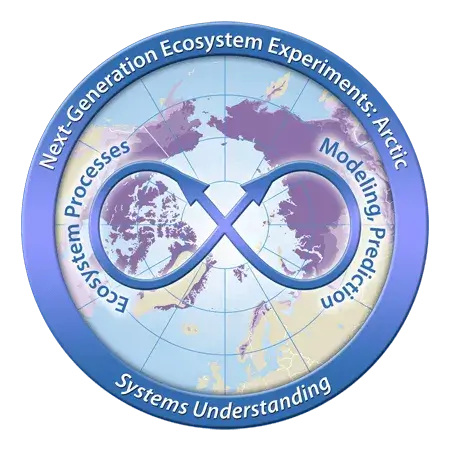Chen, Hongmei, et al. “Molecular Insights into Arctic Soil Organic Matter Degradation under Warming”. Environmental Science & Technology, vol. 52, no. 8, 2018, pp. 4555-64, https://doi.org/10.1021/acs.est.7b05469.
Publications
Displaying 21 - 40 of 78
By year of publication, then alphabetical by title
- Bjorkman, Anne D., et al. “Plant Functional Trait Change across a Warming Tundra Biome”. Nature, vol. 562, no. 7725, 2018, pp. 57-62, https://doi.org/10.1038/s41586-018-0563-7.
- Vaughn, Lydia J. S., and Margaret S. Torn. “Radiocarbon Measurements of Ecosystem Respiration and Soil Pore-Space Carbon Dioxide in Utqiaġvik (Barrow), Alaska”. Earth System Science Data, vol. 10, no. 4, 2018, pp. 1943-57, https://doi.org/10.5194/essd-10-1943-2018.
- Lara, Mark J., et al. “Reduced Arctic Tundra Productivity Linked With Landform and Climate Change Interactions”. Scientific Reports, vol. 8, no. 1, 2018, https://doi.org/10.1038/s41598-018-20692-8.
- Tran, Anh Phuong, et al. “Spatial and Temporal Variations of Thaw Layer Thickness and Its Controlling Factors Identified Using Time-Lapse Electrical Resistivity Tomography and Hydro-Thermal Modeling”. Journal of Hydrology, vol. 561, 2018, pp. 751-63, https://doi.org/10.1016/j.jhydrol.2018.04.028.
- Lombardozzi, Danica L., et al. “Triose Phosphate Limitation in Photosynthesis Models Reduces Leaf Photosynthesis and Global Terrestrial Carbon Storage”. Environmental Research Letters, vol. 13, no. 7, 2018, p. 074025, https://doi.org/10.1088/1748-9326/aacf68.
- Lara, Mark J., et al. “Tundra Landform and Vegetation Productivity Trend Maps for the Arctic Coastal Plain of Northern Alaska”. Scientific Data, vol. 5, 2018, p. 180058, https://doi.org/10.1038/sdata.2018.58.
- Mekonnen, Zelalem A., et al. “Twenty-First Century Tundra Shrubification Could Enhance Net Carbon Uptake of North America Arctic Tundra under an RCP_8.5 Climate Trajectory”. Environmental Research Letters, vol. 13, no. 5, 2018, p. 054029, https://doi.org/10.1088/1748-9326/aabf28.
- Langford, Zachary, et al. “Wildfire Mapping in Interior Alaska Using Deep Neural Networks on Imbalanced Datasets”. 2018 IEEE International Conference on Data Mining Workshops (ICDMW), IEEE, 2018, https://doi.org/10.1109/icdmw.2018.00116.
- Ali, Ashehad A., et al. “A Global Scale Mechanistic Model of Photosynthetic Capacity (LUNA V1.0)”. Geoscientific Model Development, vol. 9, no. 2, 2016, pp. 587-06, https://doi.org/10.5194/gmd-9-587-201610.5194/gmd-9-587-2016-supplement.
- Liu, Yaning, et al. “A Hybrid Reduced-Order Model of Fine-Resolution Hydrologic Simulations at a Polygonal Tundra Site”. Vadose Zone Journal, vol. 15, no. 2, 2016, https://doi.org/10.2136/vzj2015.05.0068.
- Xu, Xiyan, et al. “A Multi-Scale Comparison of Modeled and Observed Seasonal Methane Emissions in Northern Wetlands”. Biogeosciences, vol. 13, no. 17, 2016, pp. 5043-56, https://doi.org/10.5194/bg-13-5043-201610.5194/bg-13-5043-2016-supplement.
- Dou, Shan, et al. “A Rock-Physics Investigation of Unconsolidated Saline Permafrost: P-Wave Properties from Laboratory Ultrasonic Measurements”. GEOPHYSICS, vol. 81, no. 1, 2016, pp. WA233 - WA245, https://doi.org/10.1190/geo2015-0176.1.
- De Kauwe, Martin G., et al. “A Test of the ‘one-Point method’ for Estimating Maximum Carboxylation Capacity from Field-Measured, Light-Saturated Photosynthesis”. New Phytologist, no. 3, 2016, pp. 1130-44, https://doi.org/10.1111/nph.13815.
- Throckmorton, Heather M., et al. “Active Layer Hydrology in an Arctic Tundra Ecosystem: Quantifying Water Sources and Cycling Using Water Stable Isotopes”. Hydrological Processes, 2016, https://doi.org/10.1002/hyp.10883.
- Tang, Guoping, et al. “Addressing Numerical Challenges in Introducing a Reactive Transport Code into a Land Surface Model: A Biogeochemical Modeling Proof-of-Concept With CLM–PFLOTRAN 1.0”. Geoscientific Model Development, vol. 9, no. 3, 2016, pp. 927-46, https://doi.org/10.5194/gmd-9-927-2016.
- Tang, Guoping, et al. “Biogeochemical Model of Carbon Dioxide and Methane Production in Anoxic Arctic Soil Microcosms”. Biogeosciences Discussions, 2016, pp. 1-31, https://doi.org/10.5194/bg-2016-20710.5194/bg-2016-207-supplement10.5194/bg-2016-207-RC110.5194/bg-2016-207-RC210.5194/bg-2016-207-RC310.5194/bg-2016-207-AC110.5194/bg-2016-207-AC2.
- Olefeldt, David, et al. “Circumpolar Distribution and Carbon Storage of Thermokarst Landscapes”. Nature Communications, vol. 7, 2016, p. 13043, https://doi.org/10.1038/ncomms13043.
- Euskirchen, Eugénie S., et al. “Consequences of Changes in Vegetation and Snow Cover for Climate Feedbacks in Alaska and Northwest Canada”. Environmental Research Letters, vol. 11, no. 10, 2016, https://doi.org/10.1088/1748-9326/11/10/105003.
- Parazoo, Nicholas C., et al. “Detecting Regional Patterns of Changing CO <sub>2< Sub> Flux in Alaska”. Proceedings of the National Academy of Sciences, vol. 113, no. 28, 2016, pp. 7733-8, https://doi.org/10.1073/pnas.1601085113.

